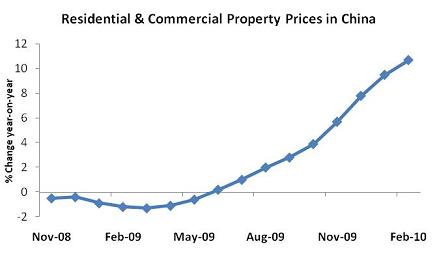Recently in the Financial Times, INET advisor Yu Yongding makes the case that in the short-term, the growth is fine, but will present problems over the longer term. He notes that the in 2009, China’s growth was 9.1 percent, which was impressive in the midst of a global financial crisis: “Although China’s huge stimulus package was a great success,” writes Yongding, “it also stored up serious problems for the future.”
According to Yongding, those problems are mainly due to the fact that China’s stimulus invested in infrastructure, and if that if that infrastructure will only bring returns if matched with other growth: “Where will tolls come from if there is no traffic on an eight-lane highway?” he asks.
Indeed, China’s stimulus investment has caused housing prices to skyrocket, igniting concerns over a potential bubble in the country’s housing market:

However, Yongding notes that the new policies introduced by the Chinese government to contain property development seem to be working, at least for the moment. However, he is concerned for the country’s future: “A viable economy cannot be built on steel and concrete alone,” Yongding writes, “and China’s problem is more its poor allocation of resources than the bursting of a property bubble.”
“The danger is that deflation will set in and the growth process will break down.”
At INET, we are concerned with these issues, especially in regards to China’s recent stimulus. Is this a model that other countries should look at during this time of financial crisis? Or Should we be more concerned with alleviating our deficits?

